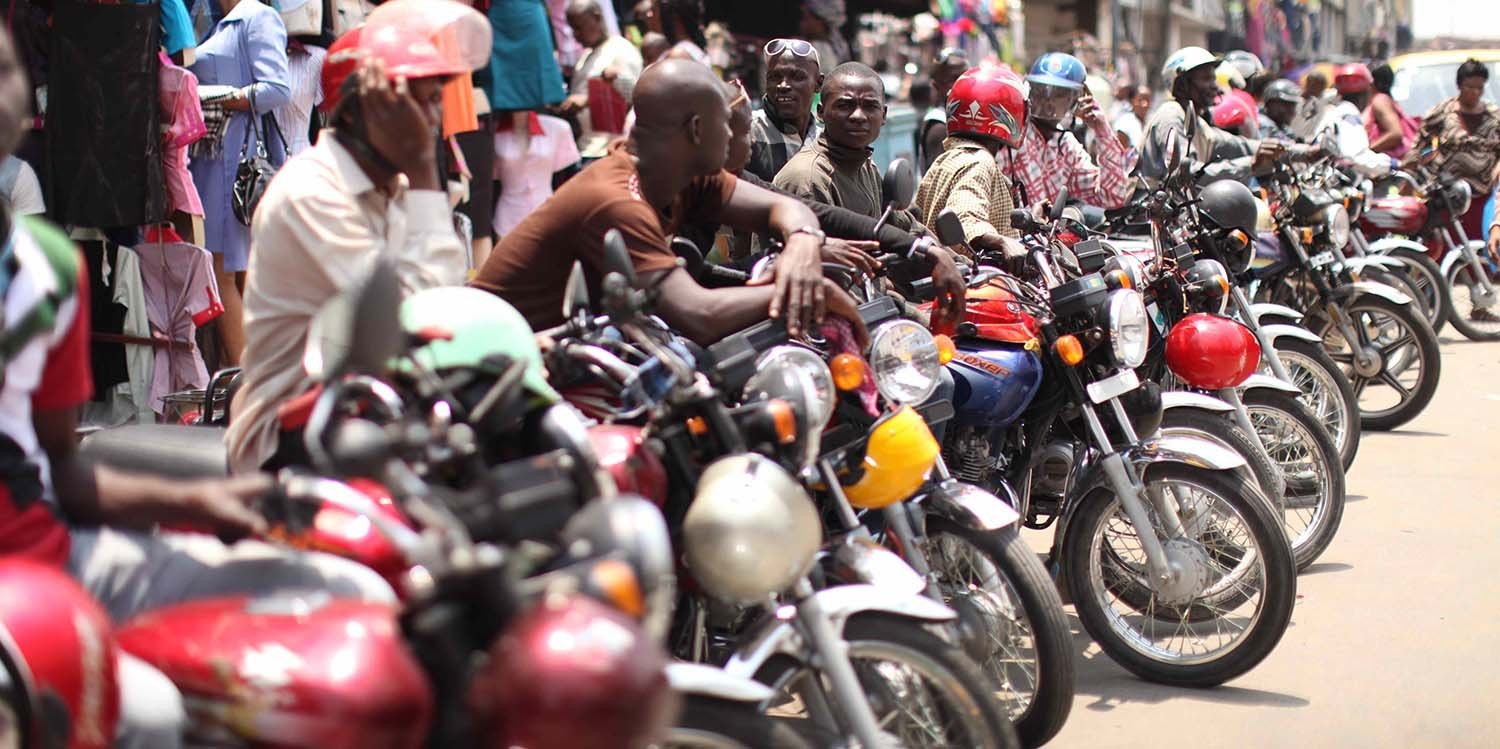Inside Lagos Where Roguish Unions Extort Bike-Hailing Firms With Bogus Taxes & Gov’t Calls It Fair Game

“Bike-Hailing Wars” Has A New Meaning
When people first used the term ‘bike-hailing wars’ to characterise the bike-hailing scene in Nigeria’s commercial nerve, Lagos, it was probably intended as a cool way of referring to the bubbly and competitive nature of the emerging industry headlined by the likes of Metro Africa Xpress (MAX.ng), GoKada, and most-recently, ORide — the bike-hailing service of OPay.

Source: TechCabal
But it’s somewhat ironic that the ‘bike-hailing wars’ term is now probably most apt for describing the terror unleashed on bike-hailing companies by roguish, mafia-like transport unions, masquerading as interest groups, whose stock in trade is to intimidate and extort under the guise of “protecting the lives of people plying the roads and upholding the interest/rights of road transport workers.”
And to make matters worse, it appears these unions have the government’s blessing. That is why it can be said that when the Lagos State Government finally stepped in to address the issue, it was to pander to the unions and order the bike-hailing companies to bend over and take the pummeling.
Unions+Government Vs Ride-Hailing Companies
Yes, for several months, the government has looked the other way while individuals affiliated to the National Union of Road Transport Workers (NURTW) and Road Transport Employers’ Association of Nigeria (RTEAN) have taken turns to remind the bike-hailing firms that they own the turf, and by extension, whatever funds made by those firms.
Lagos is definitely not ready for business.
Agberos right now stopping oride, gokada and maxng bikes in Ojuelegba.
They want the riders to pay N500 for a N100 ticketMy trip has been canceled pic.twitter.com/GhuEvENilc
— Olamide Egbayelo (@olamideyelo) July 17, 2019
It didn’t take long before the unions grew bolder with their demands. At first, it was just a few demands and disruptions here and there — several bike-hailing riders being manhandled by Agberos on the roads and being forced to pay up to 5-times a ‘daily levy’ that is dubious in its very nature.
Then eventually, the unions thought to take things to another level, encouraged by a warped, misguided idea that “bike-hailing startups operating in Lagos are deep-pocketed foreign companies that have no business making money off of the roads and must be milked for all they’ve got if they must operate.”

Source: TechCabal
It was with that enormous false sense of entitlement that the NURTW joined ranks with RTEAN to initially demand that bike-hailing companies pay a daily levy of NGN 1 K for every bike they have on the road.
With the likes of MAX.ng, GoKada, and ORide having no less than 1,000 bikes each in their fleet, those startups would each be parting with at least NGN 364 Mn (USD 1 Mn) yearly just to keep the “transport mafia” happy.
And that’s apart from the corporate taxes and other operating fees these startups already pay to both the federal and state governments which easily runs into millions of naira.
Government & Unions Ganging Up Against Ride-Hailing Companies?
As the co-founder of one of the bike-hailing startups told WeeTracker on condition of anonymity: “We’ve had ongoing meetings with the unions, with the government in the middle.”
He added, “At the very beginning, the unions demanded NGN 1 K flat per motorcycle rider per day as union tax. That was extremely prohibitive.”

Of course, the bike-hailing firms rejected this offer during the negotiations, challenging the legality of the demands of the unions and the insinuation that all the bike-hailing firms are owned by foreigners.
As a matter of fact, a source who was present at one of those meetings told WeeTracker that MAX.ng (by all accounts, a logistics startup co-owned by Nigerians who pioneered app-based bike-hailing in West Africa), had its co-founder, Adetayo Bamiduro, almost booted out of a meeting with the unions for daring to challenge the “mafia”.
As the source said: “At those meetings, he questioned the constitutional basis for those taxes. Of course, as expected, he was shouted down and they threatened to bundle him out of the meeting for asking such questions.”
The source added: “A lot of indirect threats were issued, a lot of threats to disrupt the bike-hailing businesses were dished out, and all kinds of show-of-force by the unions were executed.”
“We rely on the government to understand our point of view and protect us from this challenge. But unfortunately, the government’s position has been that we must pay some form of tax to the unions even though this is clearly unconstitutional,” the source said.
Source: Medium
Well, the government may have been too busy to notice the extortion suffered by ride-hailing firms all these past months, engrossed in their own agenda of applying make-up on a proposed NGN 25 Mn-a-year licensing regime for bike-hailing services in Lagos (besides the legal taxes and fees already being paid).
But when the government finally noticed and stepped in to mediate, their verdict was that the startups do as the unions have asked.
“For the ride-hailing companies, if the government moves to validate the activities of the unions, then we have no other recourse. The other recourse is to go to the courts but that can drag on for years and still result in an unfavourable outcome. And all the while, our riders would be at risk on the roads,” said the source who also has interests in the bike-hailing space.
Rigged System Put Ride-Hailing Firms In No-Win Situation From The Start
During the negotiations, after the shylock unions demanded NGN 1 K per rider per day, the startups produced a counter-offer of NGN 20.00 per driver per day. Predictably, the out-for-blood unions scoffed at the offer, declaring that they wouldn’t go below NGN 500.00 per rider per day.
Source: TechCrunch
The source told WeeTracker that they rejected this new offer which would cost them up to NGN 182 Mn (USD 500 K) per year, instead proposing NGN 100.00 per rider per day; quite a generous amount given that they are being sweated for “informal tax” that they still can’t understand and, quite frankly, shouldn’t be paying.
But the startups were never in a position to negotiate from the beginning as it seems the government and unions were in league with one another from the onset.
Only one party held all the cards from the start and there was no doubt as to who was going to dictate the terms. The negotiation was, in fact, just a front for permitted extortion.
With the unions going no lower than NGN 500.00 per rider per day and the startups holding out for NGN 100.00, an impasse was reached. But that was before government representatives pretty much ordered the startups to do as they have been told.
A fortnight ago, news headlines read that the transport unions in Lagos had reached an “agreement” with bike-hailing startups. A splitting formula was even put forward for the NGN 500.00 daily levy — NGN 200.00 each for the NURTW and RTEAN, and NGN 100.00 for the local government where the levy was paid.
But after hearing from the source, it can be said that the current arrangement was neither an agreement nor was it a compromise. It was more like an imposition.
“After our conversation, government representatives imposed the unions’ demands on us. They called it a take-it-or-leave-it offer, saying we have to accept the NGN 500.00 per rider per day demanded by the unions. So that is where things are at,” the source said.
Interestingly, some of these startups, like MAX.ng, also operate tricycle taxi (Keke) services, and it is known that the unions collect between NGN 1.5 K to NGN 2.5 K from each of the company’s Keke riders daily.
The new NGN 500.00 daily levy is yet to officially take it effect but the source said when the levy does kick in, an in-house arrangement is being both in place to ensure that neither the users nor the riders suffer unduly.
Are The Unions & The Government In Bed With One Another?
Short answer: Probably yes.
In Nigeria, bodies like the NURTW and RTEAN exist to uphold the interests/rights of road transport workers/stakeholders, and perhaps “protect the lives of those operating on the road,” as Dr. J. O. Spencer, the NURTW’s Head of Special Duties, told TechCabal recently.
However, it is not clear how these unions actually go about upholding rights or protecting lives, and it is perhaps even more perplexing how these unions morphed into agencies for illegal tax collection.
If anything, the NURTW is certainly not known for safeguarding lives on Nigerian roads — there are other agencies who shoulder that responsibility.
While the NURTW may have been originally created to cater to the interests of road transport workers, it has derailed from that intention and become a part-time pseudo-paramilitary group for causing unrest and violence, especially during election periods in the South-Western parts of Nigeria.
What mamner of politics is this? This happened just now in Lagos… pic.twitter.com/Xd3fW3R5Mh
— Dele Momodu Ovation (@DeleMomodu) January 8, 2019
It is no news to learn about infighting between factions within the NURTW and election-related violence perpetrated by armies of thugs and touts affiliated to the union.
As a matter of fact, it is an unspoken requirement for political office aspirants, especially in Nigeria’s South-West, to keep the NURTW and RTEAN happy if they want to have any chance of winning elections.
So, one could say those unions play more of political roles these days, causing chaos during elections.
When they are not doing any of that, they have touts out on the roads intimidating road users, collecting money from commercial transporters, and fighting with anyone who dares stand their ground. Where all the money they collect goes? Well, nobody really knows — except a few persons who are in on it.
One thing is clear; transport unions do wield power in Lagos and there may be some truth in the claim that the government needs them on their side — which is why the ride-hailing companies are being thrown under the bus.
Why The Unions Are Going After Bike-Hailing Companies
In the World Bank’s latest Doing Business Rankings, Nigeria was one of the top 10 reformers globally — jumping 15 places to 131st position globally.
On paper, it looks like things are improving but the recent action against bike-hailing startups in Lagos — which has even seen hundreds of bikes getting impounded by government agencies — is just one part of a multi-faceted problem which paints a picture of the harsh realities of doing business in Nigeria.
Can Opay bikes survive this harsh reality? 3 trucks of impounded bikes today. pic.twitter.com/kDL7GWUEpU
— Festus. (@MrFestusEmeka) December 2, 2019
It is a mockery of efforts aimed at making Nigeria an easier place to do business. And guess who is overtly or covertly enabling this mockery — the government themselves.
The country remains a tough place to do business where companies have to not only side-step dire infrastructural inadequacies but also jump over hurdles laid out by government institutions or roguish bodies who have the government’s blessing.

Source: Nairaland
Motorbikes have been used as a mode of road transport in Nigeria for several decades; one of the many “individual-spawn fixes” of the many failings of governments past and present. However, all those years, the informal, haphazard nature of the service meant that lives were put at risk and service delivery was poor.
And the unions reigned supreme as the Okada riders cowered and bowed to their every will — the unions always got their due from riders operating in certain areas.
The union has been able to hold sway because bus drivers and Okada riders are informally organised. The union serves as the face of these drivers in meetings with governments, purportedly representing their interests. That was the status quo.
Source: Medium
It was only a few years ago that MAX.ng decided to improve the system by rolling out the first app-based motorbike taxi service in not only Nigeria but the whole of West Africa.
By introducing technology and equipping riders with the appropriate training and gear while making them part of a corporate arrangement, the startup formalised the system and gave Okada a new meaning.
After MAX.ng came GoKada, EasyMobility, ORide, and others in Nigeria — all of these companies providing employment for thousands and bringing nobility to the Okada business which was once passed off as something reserved for uncouth individuals and hooligans with little regard for safety and customer satisfaction.

Source: ORide
Seeing that bike-hailing companies are starting to own the turf, and deservedly too, the unions appear determined to use their ill-gotten power to clip the wings of the high-flying startups. It’s the classic first response to any hint of imminent change — resistance and a tendency to cling on to the status quo at all costs.
And the fact that some of the bike-hailing firms are, indeed, foreign-owned/VC-backed only gives the unions added impetus to intimidate and extort.
During the conversation with TechCabal, Spencer, the NURTW chieftain, eventually laid out the thinly-veiled grievance of the unions.
“We saw a lot of thousands [sic] of motorcycles on the road, you think we will not raise our eyes?” he exclaimed. “As long as they come to Iyana Ipaja, Ajegunle or Palmgrove, they will do what the others are doing,” said Spencer. He also said that the union is hellbent on making bike-hailing pay up because they are “foreign”.
Well, from the turn of events which has seen the government take sides with roguish unions, it can be construed that the government is feeding a monster that it might eventually struggle to tame. And Lagos, in particular, is doing one hell of an exhibition for the foreign investors it hopes to attract.